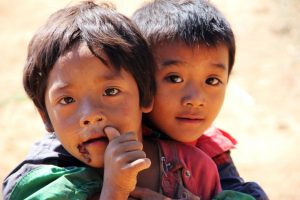Goodness in Dark Places.
Today (27 September) is the 106th World Day of Migrants and Refugees. Because of what I have seen and lived, I know that the journey of refuge or migration is a dark, difficult place. Yet there is always goodness to be seen.
Let me take you there.

A refugee camp on the Thai Cambodia border. Almost two hundred thousand people are crammed into a small space sheltering under bamboo and blue plastic tarps. No running water. No electricity. Not enough food. Brutal guards. There is no ‘safe haven’ here. A woman who has just stumbled through a hole in the fence and into the camp clings to me, convulsed in sobs. A wide-eyed toddler clasps at her sarong and looks up. His mother is gasping for breath and blurting her sorrow. Government forces suspected her husband of ‘something’. They killed him in front of her despite her screams. They snatched the baby from her arms and swung him against a tree. The little boy looking up has seen it too. He makes no sound. My tee shirt is soaked with tears. Close beside me are other Cambodian refugees. She belongs in their arms, not mine. This community that knows how to love and to heal. They will take her, hear her, show her how to stay safe, protect her. There is goodness here.
A western suburb of Melbourne. A strongly built, gentle, South Sudanese man sits at the kitchen table, stirring sugar into his mug of tea. I have known his family during the time that the youngest three of his six children were born. Usually we talk of day-to-day things. Today he is thoughtful. He glances at the crucifix on the wall. ‘I was about 9 when my eldest sister was tortured all day by the invading Sudan soldiers … she died, and we cared for her little, little baby … then our family separated in danger … I ran north … sheltered for a while by the Salesians’. We sit silently drinking our tea. ‘Grew older … thought I was safe … dared to attend a Catholic wedding further outside the Salesian walls … imprisoned without trial … accused of being Christian…stripped and publicly whipped.’ He stands, boils the kettle again. There is nothing I can say. ‘Like Jesus’ he says. He fled to Egypt, was recognised as a refugee and now is a poorly paid security guard in outer western Melbourne, a place that our media describes as very dangerous. ‘I think this is what God wants in my life. Of course.’ he says. ’I can keep young South Sudan kids out of trouble there and protect people from racist attacks’. Again, I sense the goodness that enlarges in terrible times.
I have heard such stories time and again in the public housing towers in Melbourne where new arrivals living in poverty congregate.
By the grace of God, I do believe, an experience that tests a person to the limits can be a seedbed of human goodness.
William Butler Yeats in his poem ‘Easter 1916’ reflected on the transformation that can arise in times of suffering and sacrifice.
Image Source: Human Poverty Humanitarian Children obtained from Max Pixel. Used with permission.
